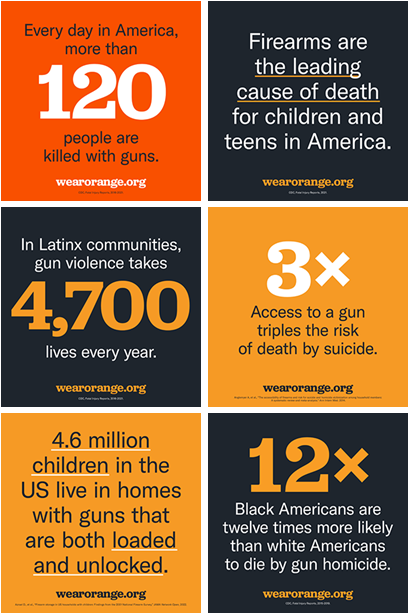The Topline
Key data points
Today is National Gun Violence Awareness Day and the beginning of Wear Orange Weekend. The Topline in this edition of the Impact Newsletter is dedicated to data points on the devastating costs of gun violence in America.

Wear Orange to Prevent Gun Violence
Today, for National Gun Violence Awareness Day and the start of Wear Orange Weekend, hundreds of thousands of people across the country will dress in orange to honor survivors of gun violence, and highlight the devastating impact it’s had on individuals, families, and communities. A majority of Americans support stronger gun laws, and our partners at Everytown for Gun Safety have mobilized millions to put an end to gun violence. With so much at stake, Wear Orange Weekend is an opportunity to show the continued strength of the movement for sensible, effective protections. Learn how to get involved at https://wearorange.org/ways-to-participate.
Winning Cities of the Bloomberg Initiative for Cycling Infrastructure
Successful cities need transportation systems that allow people to move safely, efficiently, and sustainably. Research consistently shows that people who cycle are healthier and happier — but cities need infrastructure that keeps riders safe and connects people to the places they want to go. Designed to help city leaders meet this need, the Bloomberg Initiative for Cycling Infrastructure is awarding 10 cities funding and technical assistance to implement innovative, bike-friendly street designs that serve as many residents as possible. The 10 winning BICI cities hail from 10 countries on five continents and collectively represent more than 15 million residents. They include: Fortaleza, Brazil — winner of a $1 million prize — and Addis Ababa, Ethiopia; Bogota, Colombia; Lisbon, Portugal; Milan, Italy; Mombasa, Kenya; Pimpri-Chinchwad, India; Quelimane, Mozambique; Tirana, Albania; and Wellington, New Zealand — each of which will receive $400,000 in funding.
Increasing Economic Independence for Women in Rwanda, Democratic Republic of Congo, and Nigeria
An independent study by the Johns Hopkins School of Advanced International Studies found that over a 10-year period, the Bloomberg Philanthropies Women’s Economic Development Initiative produced large-scale economic improvements for women in three post-conflict African nations. The program helped women save more, continue their children’s education beyond primary school, afford health care, and more. The report makes the case that the Initiative is sustainable, scalable, and transferable, and could serve as a model for policies and programs benefiting women and girls who make up a disproportionate amount of the 1.2 billion people living in extreme poverty around the world, and the communities they live in.
Committed to the core belief that women are central to economic growth, the Women’s Economic Development Initiative partners with governments, nonprofits, and the private sector to create opportunities for women that lead to economic independence. Since 2007, more than 724,000 women and their families have enrolled in training and education programs across the Initiative, directly benefiting over 2.8 million of their children.
“High-Fliers” Expand College Access and Success for Lower-Income Students
Family income continues to play an outsized role in educational opportunity, and too many lower-income students are missing out on the chance to build a better future. To help address that challenge, Bloomberg Philanthropies recently recognized 28 colleges and universities across the country as American Talent Initiative (ATI) High-Fliers for demonstrating steady gains in lower-income student enrollment. High-Fliers have used innovative recruitment, enrollment, and retention practices to foster socioeconomic diversity in their student communities. Now, ATI and Bloomberg Philanthropies will work with the High-Fliers to build on what they have learned, and help other four-year colleges and universities across the nation improve access for lower-income students.
Leading with Data, Improving Lives in Cities Around the World
As urban populations continue to grow, data is a powerful tool that city leaders can use to tackle major challenges and improve the lives of residents. To help enhance the use of data in cities around the world, 20 mayors from 11 U.S. and 9 Latin American cities recently joined the Bloomberg Philanthropies City Data Alliance. As part of the Alliance, the mayors will receive executive education and coaching on the ways data can help improve city operations and tackle targeted issues ranging from health care access and waste management to racial equity and affordable housing. Their cities will also have opportunities to engage with other local leaders and experts to share ideas and solutions.
Video Spotlight
For commencement season, Mike took a moment to share some thoughts with the Class of 2023, which has persevered through some of the most significant challenges that any graduating class has ever seen.

